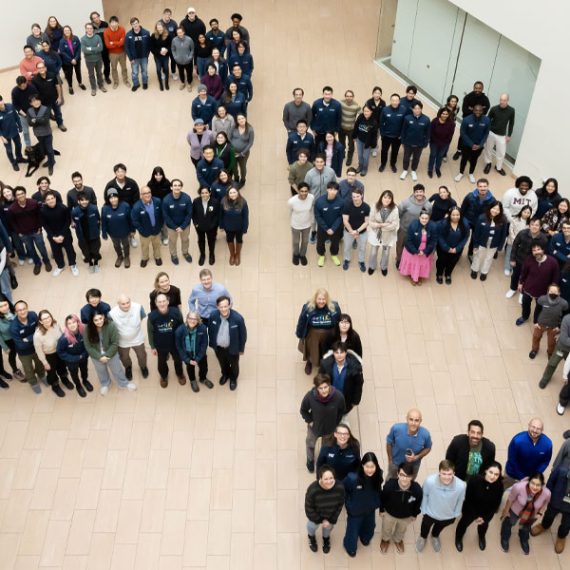MIT’s McGovern Institute honors Emory neuroscientist for contributions to psychiatry
The McGovern Institute for Brain Research at MIT announced today that Michael Davis, a neuroscientist at Emory University in Atlanta GA, will be the 2008 recipient of the Edward M. Scolnick Prize in Neuroscience. The Scolnick Prize is awarded annually by the McGovern Institute to recognize an individual who has made outstanding advances in the field of neuroscience. Dr. Davis, who is the Robert W. Woodruff Professor of Psychiatry and Behavioral Sciences at Emory University School of Medicine, will receive the 2008 prize for his work on the neural basis of fear and its applications to psychiatric research.
“We are delighted to honor Mike Davis with this award”, said Robert Desimone, director of the McGovern Institute and chair of the selection committee. “Not only has he made many important contributions to basic neuroscience, his work also represents one of the best examples of bench-to-bedside translational research in psychiatry.”
In work that spans three decades, Davis has provided fundamental insights into the neural basis of fear and anxiety. His early research exploited the startle reflex of rats in response to a sudden noise. He showed that this response is sensitive to drugs that reduce anxiety in humans, and in a classic 1982 paper he traced the entire brain pathway that underlies the startle reflex, paving the way for detailed studies of the neural mechanisms that underlie anxiety.
Like Pavlov’s dogs that were conditioned to associate a bell with food, rats and humans can learn fearful associations. The fear conditioning paradigm has been immensely influential in neuroscience, providing for example one of the earliest and best demonstrations of the importance of synaptic changes in learning. Davis has contributed importantly to this field, showing that fear learning is controlled by a class of molecules known as NMDA receptors, acting within a brain structure called the amydgala.
The ‘flip side’ of associative learning is extinction, a process by which learned associations such as fearful memories eventually disappear. Extinction is not merely the gradual decay of memory. Instead, Davis has shown that extinction involves an active process that, like the acquisition of fear memories, depends on NMDA receptors. Understanding the balance between acquisition and extinction of fearful memories is of great importance for psychiatric conditions such as anxiety disorders and PTSD, and based on his studies with rats, Davis proposed that drugs that promote NMDA receptor signaling could be used therapeutically to enhance fear extinction in humans.
In collaboration with clinical colleagues at Emory, Davis recently confirmed this idea, showing that the drug D-cycloserine can enhance the effects of psychotherapy as a treatment for fear of heights. This approach also shows promise for treating other disorders, including obsessive-compulsive disorder, social phobia, panic disorder and post-traumatic stress disorder (PTSD); Davis is currently testing D-cycloserine, in combination with virtual reality-based psychotherapy, on Iraq veterans suffering from PTSD.
The McGovern Institute will award the Scolnick Prize to Dr. Davis on Monday April 14, 2008, at 4pm. Dr. Davis will deliver a lecture entitled “Neurobiology of Fear, Anxiety and Extinction: Implications for Psychotherapy”, followed by a reception, at the McGovern Institute in the Brain and Cognitive Sciences Complex, 43 Vassar Street (building 46, room 3002) in Cambridge. The event is free and open to the public.
###
About the Edward M. Scolnick Prize in Neuroscience
The Scolnick Prize, awarded annually by the McGovern Institute, is named in honor of Dr. Edward M. Scolnick, who stepped down as President of Merck Research Laboratories in December 2002 after holding Merck’s top research post for 17 years. Dr Scolnick is now an associate member at the Broad Institute of MIT and Harvard, where he directs the Stanley Center for Psychiatric Research. He also serves as a member of the McGovern Institute’s governing board. The prize, which is endowed through a gift from Merck to the McGovern Institute, consists of a $50,000 award, plus an inscribed gift, and is given each year to one recipient.
About the McGovern Institute for Brain Research at MIT
The McGovern Institute for Brain Research at MIT is led by a team of world-renowned, neuroscientists committed to meeting two great challenges of modern science: understanding how the brain works and discovering new ways to prevent or treat brain disorders. The McGovern Institute was established in 2000 by Patrick J. McGovern and Lore Harp McGovern, who are committed to improving human welfare, communication and understanding through their support for neuroscience research. The director is Robert Desimone, formerly the head of intramural research at the National Institute of Mental Health. Further information is available at: http://web.mit.edu/mcgovern/




